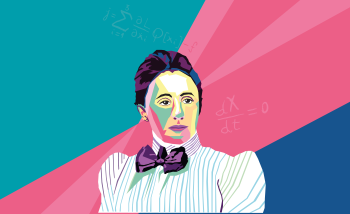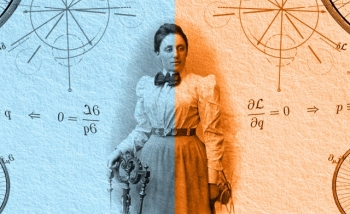What started as a pilot project to support women researchers at pivotal career moments is set to become even more powerful, thanks to a $600,000 USD grant from the Simons Foundation.
Perimeter’s Emmy Noether Fellowships have already brought 23 early- to mid-career researchers to the Institute for extended visits.
With this three-year funding, the program will expand both in size and depth: there is scope to appoint more researchers each year, and past participants will be able to return as Fellows in later years.
Perimeter will also intensify recruitment efforts in developing countries, establish the Simons Emmy Noether Fellows’ Network (a peer resource to forge and support ongoing links between Fellows), and host a Simons Emmy Noether Fellows’ Conference.
The long-term nature of the fellowships – which allows Fellows to build their collaborations over time – is a particularly powerful aspect of the program, said Perimeter Faculty member Bianca Dittrich, who chairs the Fellows’ selection committee.
“Long-term visits and the possibility of return visits will allow the pursuit of deeper research problems in these collaborations,” she said. “By providing support for bringing family along, it also allows researchers to come for longer, and thus more productive, visits.”
That interaction will not end when the Fellows return to their home institutes. “The Simons Emmy Noether Fellows’ Network will be unique in connecting highly qualified women researchers in theoretical physics across the globe and to Perimeter Institute,” Dittrich said.
Perimeter Faculty Chair Luis Lehner said the support from the Simons Foundation enables Perimeter to not only engage more researchers worldwide, but to help deepen the collaboration networks of each Fellow.
“We are now able to further amplify the scope and reach of this exciting program,” Lehner said. “This will impact physics research at the Fellows’ home institutions as well as PI. Science is an enterprise that can only get stronger by ensuring everyone has the chance to contribute to it.”
ANNOUNCING THIS YEAR’S COHORT
The 2018/19 Simons Emmy Noether Fellows are:
- Ling-Yan (Janet) Hung (Professor, Fudan University): Former Perimeter postdoctoral researcher Janet Hung is a quantum field theorist with a particular interest in quantum entanglement and the AdS/CFT. She also works closely with experimentalists to probe topological order in quantum systems.
- Valentina Forini (Lecturer, City University of London): String theorist Valentina Forini studies diverse aspects of gauge field theories using the AdS/CFT correspondence, and her work has impacted both sides of the string/gauge correspondence.
- Karen Livesey (Assistant Professor, University of Colorado): Condensed matter researcher Karen Livesey works in the area of nano-magnetism. She has particular interests in magnetic domain walls, in very small magnetic swirls called skyrmions, and in creating models for interacting magnetic nanoparticles to match experiments.
- Christine Muschik (Assistant Professor, Institute for Quantum Computing – University of Waterloo): Christine Muschik is a quantum information specialist who plans to launch an intensive effort exploring quantum simulations of lattice gauge theories, with an aim to develop new tools for basic science – specifically, quantum simulators – and to provide applications for near-term quantum devices.
- Phiala Shanahan (Assistant Professor, College of William and Mary): Particle physicist Phiala Shanahan this year launched a five-year research project into the quark and gluon structure of nuclei, with a particular interest in applying machine learning to numerical studies of the Standard Model.
- Sherry Suyu (Max Planck Research Group Leader and Assistant Professor, Max Planck Institute for Astrophysics – Technical University of Munich): Astrophysicist Sherry Suyu uses strong gravitational lensing to shed light on dark energy, dark matter, and supermassive black holes. She plans to work closely with members of Perimeter’s Centre for the Universe, and other Perimeter researchers.
About PI
Perimeter Institute is the world’s largest research hub devoted to theoretical physics. The independent Institute was founded in 1999 to foster breakthroughs in the fundamental understanding of our universe, from the smallest particles to the entire cosmos. Research at Perimeter is motivated by the understanding that fundamental science advances human knowledge and catalyzes innovation, and that today’s theoretical physics is tomorrow’s technology. Located in the Region of Waterloo, the not-for-profit Institute is a unique public-private endeavour, including the Governments of Ontario and Canada, that enables cutting-edge research, trains the next generation of scientific pioneers, and shares the power of physics through award-winning educational outreach and public engagement.


